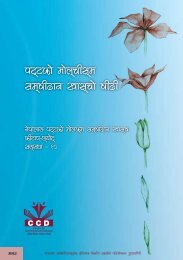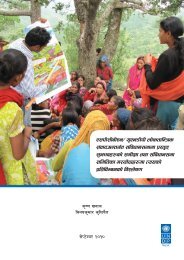The Dalits of Nepal and a New Constitution - ConstitutionNet
The Dalits of Nepal and a New Constitution - ConstitutionNet
The Dalits of Nepal and a New Constitution - ConstitutionNet
Create successful ePaper yourself
Turn your PDF publications into a flip-book with our unique Google optimized e-Paper software.
<strong>The</strong> <strong>Dalits</strong> <strong>of</strong> <strong>Nepal</strong> <strong>and</strong><br />
a <strong>New</strong> <strong>Constitution</strong><br />
63<br />
Appendix 5<br />
What do other <strong>Constitution</strong>s say about previously exploited <strong>and</strong> excluded groups?<br />
It is not only in South Asia that <strong>Dalits</strong> are found, but it is<br />
there that the caste system was ingrained in society 68 .<br />
And it is there that one might expect to find specific<br />
provisions in constitutions about <strong>Dalits</strong>.<br />
In the <strong>Constitution</strong> <strong>of</strong> India we find a clear statement that<br />
untouchability is abolished, <strong>and</strong> various provisions saying<br />
that everyone is equal, <strong>and</strong> that there must be no<br />
discrimination including on the basis <strong>of</strong> caste:<br />
Right to Equality<br />
14. Equality before law — <strong>The</strong> State shall not deny to<br />
any person equality before the law or the equal protection<br />
<strong>of</strong> the laws within the territory <strong>of</strong> India.<br />
15. Prohibition <strong>of</strong> discrimination on grounds <strong>of</strong> religion,<br />
race, caste, sex or place <strong>of</strong> birth —<br />
(1) <strong>The</strong> State shall not discriminate against any citizen<br />
on grounds only <strong>of</strong> religion, race, caste, sex, place<br />
<strong>of</strong> birth or any <strong>of</strong> them.<br />
(2) No citizen shall, on grounds only <strong>of</strong> religion, race,<br />
caste, sex, place <strong>of</strong> birth or any <strong>of</strong> them, be subject<br />
to any disability, liability, restriction or condition with<br />
regard to —<br />
(a) access to shops, public restaurants, hotels <strong>and</strong><br />
places <strong>of</strong> public entertainment; or<br />
(b) the use <strong>of</strong> wells, tanks, bathing ghats, roads<br />
<strong>and</strong> places <strong>of</strong> public resort maintained wholly<br />
or partly out <strong>of</strong> State funds or dedicated to<br />
the use <strong>of</strong> the general public.<br />
(3) Nothing in this article shall prevent the State from<br />
making any special provision for women <strong>and</strong><br />
children.<br />
(4) Nothing in this article or in clause (2) <strong>of</strong> article 29<br />
shall prevent the State from making any special<br />
provision for the advancement <strong>of</strong> any socially <strong>and</strong><br />
educationally backward classes <strong>of</strong> citizens or for the<br />
Scheduled Castes <strong>and</strong> the Scheduled Tribes.<br />
16. Equality <strong>of</strong> opportunity in matters <strong>of</strong> public<br />
employment.<br />
(1) <strong>The</strong>re shall be equality <strong>of</strong> opportunity for all citizens<br />
in matters relating to employment or appointment<br />
to any <strong>of</strong>fice under the State.<br />
(2) No citizen shall, on grounds only <strong>of</strong> religion, race,<br />
caste, sex, descent, place <strong>of</strong> birth, residence or any<br />
<strong>of</strong> them, be ineligible for, or discriminated against<br />
in respect <strong>of</strong>, any employment or <strong>of</strong>fice under the<br />
State.<br />
(3) Nothing in this article shall prevent Parliament from<br />
making any law prescribing, in regard to a class or<br />
classes <strong>of</strong> employment or appointment to an <strong>of</strong>fice<br />
under the Government <strong>of</strong>, or any local or other<br />
authority within, a State or Union territory, any<br />
requirement as to residence within that State or<br />
Union territory prior to such employment or<br />
appointment.<br />
(4) Nothing in this article shall prevent the State from<br />
making any provision for the reservation <strong>of</strong><br />
appointments or posts in favour <strong>of</strong> any backward<br />
class <strong>of</strong> citizens which, in the opinion <strong>of</strong> the State,<br />
is not adequately represented in the services under<br />
the State.<br />
(4A) Nothing in this article shall prevent the State<br />
from making any provision for reservation in<br />
matters <strong>of</strong> promotion, with consequential<br />
seniority, to any class or classes <strong>of</strong> posts in the<br />
services under the State in favour <strong>of</strong> the<br />
Scheduled Castes <strong>and</strong> the Scheduled Tribes<br />
which, in the opinion <strong>of</strong> the State, are not<br />
adequately represented in the services under<br />
the State.<br />
(4B) Nothing in this article shall prevent the State<br />
from considering any unfilled vacancies <strong>of</strong> a<br />
year which are reserved for being filled up in<br />
that year in accordance with any provision for<br />
reservation made under clause (4) or clause<br />
68<br />
This is not the place to explore the geographical dimensions <strong>of</strong> caste. Pakistan, Bangladesh <strong>and</strong> Sri Lanka also have caste issues – though there is a great deal <strong>of</strong> denial. And<br />
in western countries also there are now many stories <strong>of</strong> caste discrimination among immigrant communities.


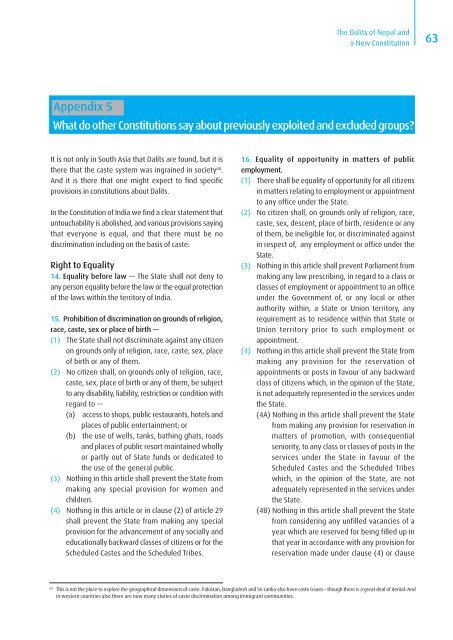

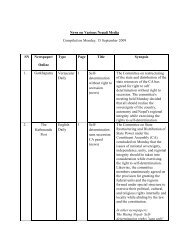

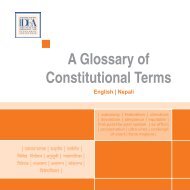
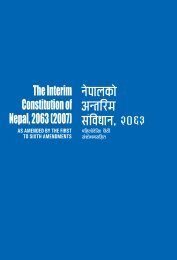
![g]k fnsf blntx? / gofF ;+l jwfg](https://img.yumpu.com/49483602/1/184x260/gk-fnsf-blntx-goff-l-jwfg.jpg?quality=85)
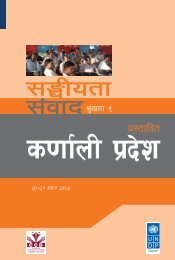
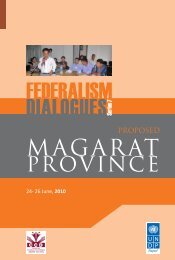
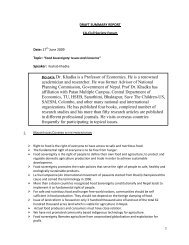
![+ljwfg;ef, /fHosf]k'g](https://img.yumpu.com/41604075/1/184x260/-ljwfgef-fhosfkg.jpg?quality=85)
